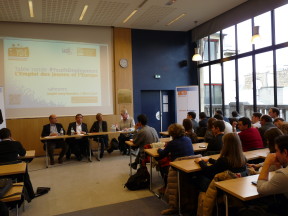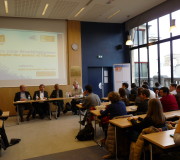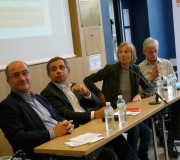 On Saturday, November 16th and Sunday, 17th, Jeunes Démocrates and Jeunes Forces Démocrates welcomed delegations from Young Democrats for Europe (youth organisation of the European Democratic Party) for a “working weekend” on Youth Employment and Europe, only a few days after an international summit in Paris which brought together European Heads of State and Government on the same topic.
On Saturday, November 16th and Sunday, 17th, Jeunes Démocrates and Jeunes Forces Démocrates welcomed delegations from Young Democrats for Europe (youth organisation of the European Democratic Party) for a “working weekend” on Youth Employment and Europe, only a few days after an international summit in Paris which brought together European Heads of State and Government on the same topic.
Youth employment is our priority, like that of a large number of our fellow citizens, and we know that Europe is the appropriate level to promote it.
This weekend is the first step to our common project to present concrete proposals for training, mobility and recognition of experience. This is also the first joint meeting between the Jeunes Démocrates and a youth organisation from UDI party on an issue we care very much about.
A hundred youths thus gathered for a panel discussion on this theme with Marielle de Sarnez, French MEP and Secretary General of the European Democratic Party, Henri Malosse, President of the European Economic and Social Committee (EESC), Alexis Govciyan Regional Councillor, and Bernard Gomel, scholar at the Centre d’Etude pour l’Emploi (CEE) in Paris as speakers.
A Europe to rebuild, to put at the service of citizens
A bitter observation is shared by all our stakeholders: Today’s Europe is not at the rendezvous of citizens: “Europe is not effective and not suitable. Europe is not on the sides of citizens who founded it. It is necessary to outline a more democratic and more efficient Europe at the service of Europeans“, states Marielle de Sarnez as an introduction.
We support a Europe which is based on citizens and acts positively in their daily lives. “We speak often of the past, not enough of the future. We need to give possibilities to the EU. I want a Europe that creates jobs, which does not expect that growth comes from the other side of the Atlantic Ocean“, assumes the Secretary General of the European Democratic Party.
Europe, a good level to create employment
What are the real issues concerning youth employment?
Bernard Gomel points out youth inequalities with regard to employment. It is impossible to talk about youth employment without considering the diversity of situations.
Two factors above all: today, the more you are qualified the better you fit into the professional world; and social inequalities are transmitted. There is also a reproduction of these inequalities through university degrees. We therefore aim at being more interested in some 900,000 young people who are not in training or looking for a job, young people who are in total disarray and unable to find a job. Today, 40% of the long-term unemployed are young people. We must build bridges to enable them to progress and to get a head start, and to reintegrate them within the professional world.
We need to have an innovative and ambitious vision to promote employment
It is not with yesterday’s recipes that we will be able to increase the level of activity. Henri Malosse particularly regrets the “show” of the European Summit on youth employment where “they refilled the same recipe for the fourth time in a year”. According to him, youth guarantee represents only 0.6% of the European financial programmes, with such bureaucratic procedures that no project will ever be filed.
Similarly, assisted jobs are not a solution. On the contrary, they create inequalities as shown in the important wage gap observed at long-term with a disadvantage for persons who receive this kind of job.
“We must act on the employment growth, and not expect that growth creates jobs“, suggests Bernard Gomel. We can create jobs without waiting for growth.
Alexis Govciyan says that nearly 500,000 companies in France, SMEs in particular, are looking for company fixers but they cannot find proper candidates due to a lack of appropriate training. We do not have to forget that 98% of companies are SMEs. We want to help these structures with a reduction of administrative burdens and charges that suffocate them. We must also ensure tax and legal stability for companies in order to enable them to develop smoothly.
A European employment market would also maximize the chances of finding a right candidate for companies, and the most suitable position for job seekers.
Education and training, 2 priorities for promoting a better access to employment
To achieve this goal, our educational and training system should be redesigned to professionalize youths. In this area, we are wrong in wanting to save money without reforms. The only answer is School, with equality of opportunities for all. Today, this is too segregated, and there are not enough mobility programmes. Erasmus touches only 1% of the students.
In this sense, we are very pleased with the Erasmus + text, adopted at the European Parliament on Monday November 18th, and which will open this program to a wider range of youth, including apprentices.
We must also focus our efforts on counselling. This must take into account the developments of society and of economy to prepare young people for the professional world. This reform must also ensure companies that trained young workers suit their expectations. Today, apprenticeship and block-release training are not sufficiently recognized by companies.
This is a broader problem with regard to professional experience that arises: we ask for experience even at the first job! Therefore, we must review the definition of experience.
These are potential leads that will enable us to develop in the coming months concrete proposals for transforming Europe as a leader in terms of innovation in employment, and more especially youth employment.



